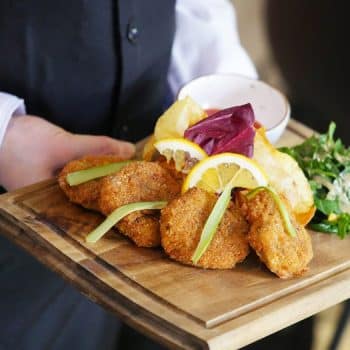
This post presents detailed information on the food server job description and career, including the key tasks, duties, and responsibilities they commonly perform.
it also provides ideas on how to become a food server, and the major requirements that you may be expected to meet to be hired for the food server job by employers/recruiters.
What Does a Food Server Do?
A food server, also known as a waiter or waitress in a service restaurant typically takes orders for beverages and food from customers, then serves them the items as requested.
A food server job description includes both preparing and serving the food at various venues. A perfect example might include hotels, cafes, and fast food restaurants.
According to reports on O*NET OnLine, the tasks typically performed by food servers include placing food servings on trays or plates in response to instructions or orders.
It also involves cleaning or sterilizing kitchen utensils, dishes, equipment, and facilities.
The pay of a food server might be a combination of tips from customers and an hourly wage, with tips often times constituting the major part his/her earning.
The server’s responsibilities depend on many things, such as the location.
In a restaurant, for instance, his/her basic duties normally begin with greeting and welcoming customers as they come into the restaurant, or as they are seated at the tables.
Servers offer menus and describe the restaurant’s special dishes; they answer any question a customer might have to ask.
They take beverage and food orders, relaying them to the kitchen staff.
After serving the already prepared foods, they might follow up with the customer to ensure a remarkable dining experience was achieved for the customer.
The role of the server also entails frequent clearing of dishes from the table after customers might have finished eating.
They also present the customer with the bills and might process their payments or refer to the accounts department.
Many restaurant food servers work in stressful and sometimes demanding environments.
They are mainly always standing and often have to carry heavy items and food trays, requiring a high degree of coordination and physical strength.
In busy restaurants, servers may be responsible for several tables full of customers; yet, they must either remember specific customer requests or write down everything.
The responsibilities of a food server can vary and this depends on the location.
They greet patrons, take their orders, serve them, and clean the table afterwards.
Food Server Employment (Non-restaurant)
Food servers also work in places outside restaurant settings, such as continuing care retirement communities and assisted living facilities for the elderly.
According to the U.S. Bureau of Labor Statistics, 267,840 of food servers work in the non-restaurant industries and earn a mean hourly pay of $ 16.27.
Food Server Job Description Sample/Example/Template
Here is a sample job description for the food server position. It consists of key duties, tasks, and responsibilities normally carried out by people who work as food servers.
- Carry silverware, linen on trays, food and/or use carts to carry trays.
- Arrange food servings on trays according to orders by customers.
- Prepare food items such as soups, sandwiches, salads, and beverages.
- Examine trays to be sure that they contain items required.
- Load trays with accessories, such as condiments, napkins, and eating utensils.
- Monitor distribution of food, ensuring that meals are delivered accordingly and that guidelines are followed, such as those for people on special diets.
- Remove stack dishes and trays for return to kitchen after customers finish eating.
- Stock service stations with items like straws, napkins, and ice.
- Take food orders and communicate such to serving counters or kitchen staff so they can be filled.
- Clean and sterilize kitchen utensils, dishes, equipment, and facilities.
- Find out where patrons would like to have their meals and help them get sited.
- Monitor serving techniques and food preparation to make sure that proper procedures are followed.
- Record types of special food items served to customers and their amounts.
- Calculate amount of orders taken, present such to customers, and accept payment for services.
Food Server Job Description for Resume
When writing a resume for the post of food server, information from the job description example above can be employed in writing the employment history segment of the resume.
Food Server Requirements: Knowledge, Skills, and Abilities for Career Success
Shown below are important qualities a food server should possess to succeed on the job, and which employers usually look for when hiring new hands.
- Possess strong customer service skills.
- Possess strong stamina to withstand prolong standing.
- Strong ability to work as a team with colleagues.
- Ability to present pleasant appearance; and good manners.
- Ability to display professional behaviors.
- Possess good dress sense.
- Possess taste for good food.
Food Server Salary
According to Indeed, the average food server makes around $45,649 annually.
Some of the highest paying states include: New York, NY, $52,944; Chicago, IL $49,593; Atlanta, GA $47,996; Dallas, TX $47,612; and Austin, TX $47,473 per year.
In the United States, there are currently over 1,974,622 food servers employed.
Women make up 64.0% of all food servers, while men make up 36.0%.
An employed food server is 39 years old on average. White (62.2%) is the most common ethnicity among food servers, followed by Hispanic or Latino (19.7%), Asian (8.9%), and Black or African American (4.7%).
Food Server Career Advancement
There are different career paths available to a food server, these include:
- Restaurant Manager
One of the most widely known career paths that an individual can use to advance their calling as a food server is to become a restaurant manager.
This is normally not chosen by those who are just beginning their career in the field of food service, but it can be beneficial down the road if they choose this path instead of becoming an independent contractor.
- Host/Hostess
A host or hostess is a position that is normally used when a dining or meeting room is being rented out by an individual and they are not the person actually running the business.
They are mainly responsible for seating individuals and going to the kitchen to prepare their orders.
- Food Consultant
A food consultant is someone who works with chefs, cooks, restaurateurs and even inventors of food products to test new recipes for them with their own clientele.
Normally, they work with individuals that have their own businesses, but sometimes they are hired by restaurants as well to test new items on customers.
- Nutritionist
A nutritionist is usually the go-to person for someone who has specific dietary needs or wants to change their eating habits.
This can range from the weight loss industry, the food service industry, or even the medical profession.
Many of these people are food servers themselves and have gone on to advance their careers using this same skillset.
- Catering Supervisor
A catering supervisor is someone who does a lot of the same tasks as a food server, except for the fact that they are allowed to work off-site and do not have to go into the actual food service industry.
Many of them work in offices or warehouses and prepare meals for other people who are not in their office buildings.
This can be very beneficial without having the long hours that typical food servers deal with.
- Food truck owner/operator
A food truck is a business concept that involves a truck or a vehicle that is permanently modified to sell food to people on the go.
This can be an extremely profitable and popular option in today’s marketplace.
Depending on the laws of the city and state, it can be difficult to get the proper licenses to operate this type of business, but once they are obtained it can be very rewarding financially speaking.
- Restaurant Manager (General)
A restaurant manager (general) is someone who has many of the same responsibilities as a food server, but without having to actually go into the restaurant. This person is able to either work from their home or an office location and make menu decisions and schedule the employees.
They are just as well paid as actual food servers and can be much more flexible with their time since they don’t have to actually attend every shift physically.

- Executive Chef
An executive chef is someone who helps to organize and plan out the menus for a food service establishment.
This can be a very important role in a larger restaurant. This can include the responsibility of making a huge variety of menu items, but will also include dealing with inventory, purchasing food products, ordering supplies, and managing employees throughout the entire process.
- General Manager
A general manager is someone that helps to oversee all of the day-to-day operations within a food establishment.
This can include dealing with owner relations, employee relations, as well as the financial aspects that come with operating a restaurant.
They are responsible for the day-to-day operations and business dealings.
- Software Developer
A software developer is someone who helps to create computer programs that will run on computers and mobile devices.
This can be beneficial to those who want to advance their food service career because it can give them a unique skill set that can be valuable in getting a job at an office or developing a new technology for the automotive industry.
Challenges faced by Food Servers on the Job
As a food server, there are some challenges you might face, some of them include:
- Low Salary
Salaries for food servers are much lower than most other jobs in the United States.
This is one of the biggest challenges that they have to face and it is something that can make working in their field of choice very difficult.
They might not be able to make enough money each day to support themselves and their families and this can lead to some financial hardships down the road.
- Low Employee Morale
Employee morale is a big issue when it comes to food servers, especially in larger companies where the employers don’t care about how much work has been put into creating a pleasurable dining experience for customers.
- Long Hours
Long hours can also be another challenge when being a food server. Many of them have to work for dozens of hours in a single day, and this does not give them enough time to spend with family members or their friends.
In some cases, it can even interfere with their personal lives and make it difficult for them to advance their overall success in life.
- Poor/offensive Customer Behavior
Sometimes people turn out to be horrible human beings that are very selfish, and this can cause additional problems for food servers as they do their jobs. They might have to put up with a lot of bad behavior that is common in the food service industry.
- Lack of respect/indifference from management
Management and their employers treat most food servers just like they were a piece of machinery, and they do not seem to appreciate their efforts at all. This can be extremely demoralizing, and it can make the food servers want to work even harder just so they don’t feel like they are being taken for granted.
How to Become a Food Server
Here are some steps. to take to become a food server if you are interested in the career:
- A high school diploma or equivalent is beneficial but not essential.
Food service does not require a high school graduation or equivalent, but most employers prefer one.
English and arithmetic classes in high school help food servers enhance communication and numeracy abilities.
A restaurant manager may benefit from an Associate’s degree. Associate’s degrees in hospitality management teach accounting, marketing, and human resources.
2. Customer service experience helps
Food servers should have customer-service experience. Working in a restaurant or hospitality might provide this experience.
Many food server jobs are entry-level, so customer service expertise can help. Working as a restaurant host or hostess can teach you server tasks.
Hosts and hostesses greet and seat customers. They may collect drink orders from servers and tell customers when meals are ready.
3. Some employers demand food safety certification.
Some employers may require server certification. Local or state health departments offer online or in-person food safety certifications.
Having a food safety certification ensures that servers know how to handle raw meat and shellfish.
4. Communication and interpersonal skills are crucial.
Food servers must properly converse and serve clients. Food servers generally work close to their customers, therefore they must be prepared to handle any concerns that arise.
Ordering requires good communication. Food servers should be able to appropriately describe menu items and advise clients about specials.
5. Standing for lengthy hours and lifting heavy trays are required.
Food servers often stand for extended shifts. Serving tables may require lifting large food and drink trays. Physically fit servers can handle these jobs all day.
6. Some restaurants demand wine-savvy servers.
Some establishments require servers to know wine-and-food pairings. Knowing the menu’s ingredients helps servers describe dishes to customers.
Wine-savvy servers can offer appropriate meal accompaniments. Servers who know about wine can provide recommendations based on customers’ preferences, such as red or white, sweet or dry, light or full-bodied.
This helps servers steer diners to satisfying selections.
7. Servers in international tourist restaurants may benefit from bilingualism.
To service international travelers, some establishments may require bilingual staff. A restaurant near an international airport may recruit multilingual servers to serve non-English speakers.
Bilingual servers can engage more readily with their tables and deliver appropriate menu information.
Major Benefits of a Food Server Career
A career as a food server can be very rewarding and can help you in several ways like:
- Most of the time a food server cannot be fired because they are not paid by salary or even an hourly wage.
Most of the money that they make comes from tips which are based on how much they know about their profession as well as how well they know their profession.
2. A food server can make a good salary if they know what their clientele likes and what they don’t like.
Food servers also need to work hard in order to get a good tip because customers are not going to pay more for the same thing if they are underwhelmed by it. This is why this career choice is very important.
3. A food server has the opportunity to work in several different restaurants in many different parts of the world because of how globalized our society has become.
There are many different types of food and cuisines all over the world that a food server will get to learn about as they travel further along their career path and it is very exciting.
4. A food server can also become a manager and get paid even more than they would have if they just had the job as a normal waiter or waitress.
So becoming a manager or sommelier of a restaurant has its benefits too.
5. A food server also can be a manager of the whole restaurant and not just one specific section if they so choose to.
6. Another great benefit that a food server will have is that they will get to meet different people from all over the world and all walks of life, which helps them expand their own worldview.
7. As a food server, you will get to learn many new things about the world and how it works in terms of food structures, eating habits, and cultures.
8. Another great benefit that being a food server will provide is that it gets the employee out of their comfort zone because they are in a different atmosphere every day interacting with new people, which can be a situation that the employee would not be in their normal life.
Food Server Job Satisfaction
According to a survey by Research Gate, investigating job satisfaction of restaurant employees, including food servers, it was found majority of respondent showed low satisfaction in their work.
From a total of 798 people who participated in the survey, 386 or 50.2% indicated low job satisfaction.
197 or 25.6% showed an average level of satisfaction, while the number of those that showed a high level of satisfaction with their job was 186 or 24.2%.
This finding explains the high employee turnover in the restaurant industry, which employers have to address to keep their operations running smoothly.
Conclusion
Food servers are some of the most useful employees in a restaurant. Servers are constantly helpful, uplifting, and above all appreciated by their customers.
This post is helpful to individuals interested in becoming a food server, to boost their knowledge of the duties and responsibilities of the food server.
It is also helpful to employers/recruiters in making a detailed job description for the role.
They can apply the food server job descrption example provided on this page in making one for their companies.
References:
U.S. Bureau of Labor Statistics
O*NET OnLine
Resources for Food Servers
Here are useful resources for food servers to learn more about the hospitality industry and develop their careers:
Professional Organizations
| National Restaurant Association The National Restaurant Association is over 100 years old and is the world's largest foodservice trade association, proving representation and advocacy on behalf of the restaurant industry. | American Hotel & Lodging Association The American Hotel & Lodging Association is a leading voice and supporter of the American hospitality industry. | Food and Beverage Association of America The Food and Beverage Association of America encourages and promotes continuing education, career growth, and friendly relation among its members. It also provides scholarships in industry fields. |
Useful Blogs
| The Waiter's Academy The Waiter's Academy provides free training to industry professionals to improve on their knowledge, skills, and income. | OpenTable OpenTable's restaurant blog provides lots of valuable content for restaurant professionals. | Modern Restaurant Management This blog provides restaurant management news, expert advice, and industry trends. |
Valuable Books
| Food and Beverage Service: A Handbook for Hospitality and Tourism Services This book covers various techniquesin food and beverage service | Strategic Questions in Food and Beverage Management Discover various critical reviews of issues in food and beverage management | Food and Beverage Service This book is for individuals working towards professional qualifications in food and beverage service, as well as trainers and practitioners. |












